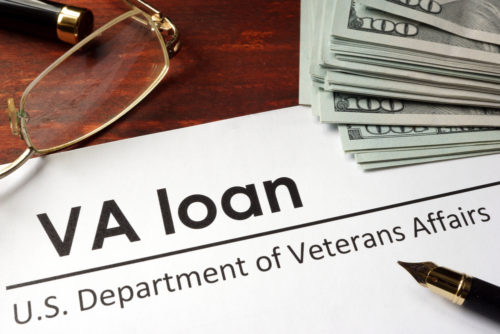While a conventional mortgage and a loan from the Department of Veterans Affairs, or VA, may seem to be the same on the surface — since both are meant to help you purchase a house — the underlying details are very different. While both are offered by private lenders, a VA home loan is backed by the federal government, giving it quite a few benefits over a traditional mortgage. If you (or your spouse) is current or former military, you may want to consider taking advantage of the features of a VA mortgage when you get ready to buy a house.
Table of Contents
No Down Payment
Traditional mortgage loans almost always require a down payment, normally around 20 percent of the total cost of the loan. The first and probably best advantage of a VA home loan is that you, as a service member, likely don’t have to worry about looking in couch cushions and saving money for a down payment. In most cases, VA mortgages require no down payment. Conventional loans, for comparison, usually require at least 5 percent (not included a PMI, which we’ll get to in a second), and a Federal Housing Administration (FHA) loan requires a 3.5 percent down payment.
Private Mortgage Insurance (PMI)
A Private Mortgage Insurance (PMI) premium is tacked on to traditional loans where the down payment is not at least 20 percent. The PMI can be between 0.3 and 1.5 percent of the loan per year, based on the down payment and borrower’s credit score. This lasts until the balance drops to 78 percent of the home’s value.
FHA loans, meanwhile, require both an upfront PMI charge and annual premium, which lasts the entire life of the loan.
It’s important to note that while a VA-backed loan does not have a PMI, there is a funding fee. This goes directly to the VA to help future soldiers with their own loans. Service members with a service-connected disability are exempt from the funding fee.
Flexible Credit Score Requirements
Generally, to get a competitive interest rate with a conventional or FHA loan, you need a fairly high credit score. This is because lenders want borrowers who are not at risk for losing the money and not paying it back. A credit score, after all, is basically a gauge of how well you pay back loans.
With a VA-backed loan, the government is taking the risk instead of you. Private lenders are much more confident the government will pay them back if something goes wrong, so it’s possible to get competitive rates with even “fair” credit.
Lower Average Interest Rates
You can expect to see interest rates between 0.5 and 1 percent lower than conventional interest rates, saving you a potentially significant amount of money in the long run. These are still based on your credit score, so while you don’t need a great score, it will help. Overall, VA-backed loans have the lowest average interest rate of any type of loan.
Lower Closing Costs
Closing costs are limited on VA home loans, meaning you may not pay as much as a traditional loan in closing costs. You can even ask the lender to pay the closing costs and up to 4 percent of the purchase price in order to cover other fees, like prepaid taxes and home insurance.
No Prepayment Penalties
Lenders want money; they are businesses, after all, and it’s part of the reason interest rates exist. If you pay back your loan early, they miss out on that interest, and will usually tack on a prepayment fee. This can be a sizeable fee, depending on how much you have paid back, and the age of the loan.
There are no prepayment fees on a VA-home loan. Should you find yourself benefiting from an unexpected windfall, you can pay back your VA-backed loan early without fear of additional fees.
Foreclosure Avoidance Advocacy
Since the VA has a dedicated staff of 150 people for loans, if you find yourself falling behind on payments, they will help you avoid foreclosure. They will advocate on your behalf to find a solution that does not end with you losing your home. Education and assistance are available, which is how the foreclosure rate was only 2 percent on VA loans in 2013, the lowest in the industry.
If a payment is 61 days past due, you will automatically be flagged for assistance, with a loan technician offering financial counseling, advice, help dealing with the lender, and other information and tools to avoid foreclosure.
VA Loans are Assumable
In a normal mortgage situation, when you sell your house, your mortgage is paid off. Then, you start another mortgage for a new home. It’s a clean cut. VA loans, however, are assumable. That means instead of paying off the original mortgage, the buyer takes over (“assumes”) the loan, and continues making payments in your stead.
This means that they buyer can benefit from the lower interest rate, you can avoid settlement charges, and the buyer may be able to simply pay in cash the difference between the sale price and the balance of the mortgage, rather than taking out a second mortgage at a higher interest rate.
It’s important to note that your entitlement may stay with the mortgage if it is assumed. That means you may not be able to get a VA loan for your new home until the original mortgage is paid off. If the buyer is also a veteran, they can substitute in their entitlement, and yours will be freed.
Basic Allowance for Housing
The Basic Allowance for Housing, or BAH, provides housing compensation based on location, pay grade, and dependency status. It is for use in civilian housing developments when government housing is not available, and can be used to pay a VA mortgage as such.
Image Source: https://depositphotos.com/





